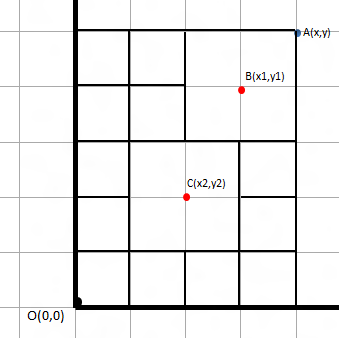| Submit | All submissions | Best solutions | Back to list |
CSPATH - Cartesian Shortest Path |
The task is simple, on the 2D cartesian coordinate system, how many different shortest path from point O(0,0) to point A(x,y), but not through point B(x1,y1) and C(x2,y2).

Score is the length of your source.
Input
The first line is an integer T(1 ≤ T ≤ 10000), denoting the number of test cases. Then, T test cases follow.
Each test case consist of 3 lines:
-first line contains two integer x and y(1 ≤ x,y ≤ 10) location of point A
-second line contains two integer x1(0 ≤ x1 < x) and y1(1 ≤ y1 ≤ y) location of point B
-third line contains two integer x2(1 ≤ x2 ≤ x) and y2(0 ≤ y2 < y) location of point C
Output
For each test case, output number of different shortest path from (0,0) to point A but not through point B and C.
Example
Input: 2
4 5
3 4
2 2
3 3
2 1
1 2 Output: 32
2
| Added by: | Tjandra Satria Gunawan |
| Date: | 2012-06-29 |
| Time limit: | 1.351s |
| Source limit: | 450B |
| Memory limit: | 1536MB |
| Cluster: | Cube (Intel G860) |
| Languages: | All except: ASM32-GCC ASM64 MAWK BC C-CLANG NCSHARP CPP14 CPP14-CLANG COBOL COFFEE D-CLANG D-DMD DART ELIXIR FANTOM FORTH GOSU GRV JS-MONKEY JULIA KTLN NIM NODEJS OBJC OBJC-CLANG OCT PICO PROLOG PYPY PYPY3 PY_NBC R RACKET RUST CHICKEN SQLITE SWIFT UNLAMBDA VB.NET |
| Resource: | Own Problem |
hide comments
|
2013-06-28 09:11:41 priyanka
If possible, could you please check submission #9564891.I've tried all test cases I could think of and can't seem to get why it's wrong. Ans: Of course, It's overflow problem. Some of your output is negative value.. Last edit: 2013-06-29 06:17:29 |
|
|
2012-09-06 17:45:49 Loers
450 B this is soooooooooo unfair >.< |
|
|
2012-07-13 14:45:58 Mitch Schwartz
Can we assume B and C are distinct? Ans: sometimes B and C could be same. Thanks for the reply. Last edit: 2012-06-30 19:54:11 |


 RSS
RSS